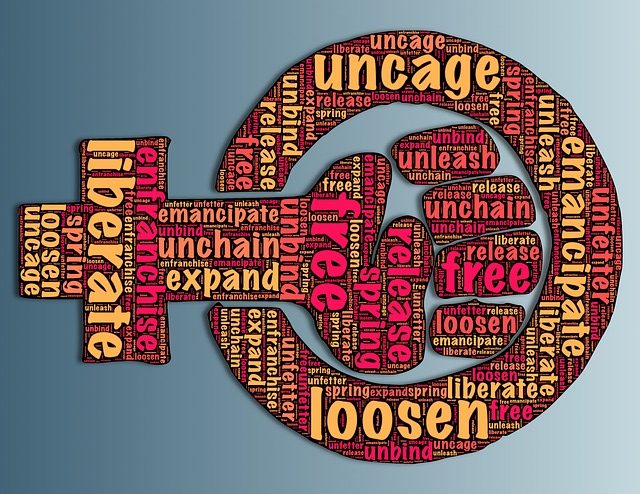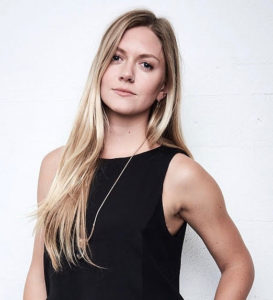Real Career Girl Doree Simon on Female Empowerment

I’m a pretty self-aware person, and when I started my career in the film industry eight years ago, I probably over-analyzed what I was in for. I was petite, blonde, bubbly, ambitious and young, working primarily in a world of men. Having lived in the US, Europe and specifically NYC thus far, my expectation for my role in the “industry” was that I would be underestimated — as I had previously been in internships and other jobs, treated like a cute, dumb blonde. So I mentally prepared for the impact. It was worse than I anticipated.
The first time I worked on a feature film in New York City, I was a production assistant helping out in pre-production. The director was an incredible pig, who regularly used his position of power to get me alone and flirt like only a 50 year old married man can with a 23 year old. Yet the 1st and 2nd assistant directors (both men), who essentially ran the set, clearly saw me differently. On my first day, I was sure to be professional, punctual and helpful. After I had taken lunch orders, I heard one call me “useless” over the walkie system. They hadn’t even checked to see if I was out of range. Clearly, they didn’t care.
Basically, if I wasn’t being treated like the “cute girl” on set, I was seen as an idiot with no technical skills or real worth. My bubbly personality was mistaken for flirtation, my role on the production team implied I didn’t have the technical skills to actually do anything “useful.” And although I felt like a resilient person, I slowly started to doubt myself… and I decided to work on documentaries to escape the world of narrative norms.
Cut to present day: I am 29 years old; still petite, less blonde, much less bubbly, and far more ambitious. Turns out, my pivot toward documentaries was the perfect move. I could use my frustration toward societal standards and expectations to fuel my passion for truth and equality in the world. I continued to produce scripted films for friends, but kept feeding my drive for journalistic storytelling, and discovered a knack for producing branded content (to pay the bills, of course). When I was 25, I had to create an LLC to be able to process it all. I was a small business owner. I had played the game for a while, and I was making it work for me.
It took me years to feel like my voice was heard let alone valued in a room — almost always the sole female in a room of men. Eventually my voice grew loud and strong, and I knew I wanted to direct in addition to producing.

Today, I have had films in festivals including Sundance and Tribeca; I am looked at as a leader and critiqued by colleagues for being too controlling… which I’m working on, but I’ll take “controlling” over “useless” any day.
I recently took the leap from freelancer to full timer, and manage a large department for filmmakers and producers who work on both branded content and documentaries. I am in a leadership position and taking advantage of it to create opportunities to enhance the voices of our female team members. This March, I helped lead the charge on a company-wide campaign for Women’s History Month and directed the first episode of a series I’m also producing called “In Her Shoes.”
“In Her Shoes” is the culmination of almost a decade of observing, researching and feeling infuriated by the gender inequality. It stemmed from a desire to use media to build bridges between the women of the world; to tell their stories in hopes of creating an understanding of their value and the importance of speaking up for it, whether you’re a man or a woman. I host the first episode, which features a 17 year old from Mumbai who was born the daughter of a sex worker, and who is transcending her circumstances to become an agent of change in her community.
While the attitude toward women in the film industry has changed drastically, especially over the last year, the number of female directors pales in comparison to the number of males. When I look at the beginning of my career — of which the above example is only one small one of so many, and much less terrible than what so many other women experience – it’s easy to see why women don’t feel entitled or heard.
Perhaps the most eye-opening quote I’ve heard in my career was by a female politician in India named Priya Dutt, who I came across when I was researching sex workers rights for “In Her Shoes.” She said, “Women put their hand up for a role when they are 90% ready. Men raise their hand when they are 50% ready…” How this resonates with me! I feel like it explains the reason men are perceived as better leaders, more tech-savvy, stronger creatives, better decision makers, and so on.
I am proud of where I am in my career right now, and glad to work for a company where I feel valued and respected. And I hope that maybe this nugget of my life can help other women feel empowered to ignore the haters, trust their heart and gut, and know that no matter how you think you are perceived, the world is your oyster. We need more women in leadership roles and creating the stories we all view online and in theaters. I’m not saying to necessarily raise your hand when you’re only 50% ready, but I am saying that you should never be afraid to raise it.
This guest post was authored by Doree

poses at the Tribeca Film Festival Getty Images Studio on April 19, 2016 in New York City.
Doree Simon is Director and Producer / Head of Branded Content Production at Matador Network.

